- Home
- Michael Chabon
McSweeney's Mammoth Treasury of Thrilling Tales Page 4
McSweeney's Mammoth Treasury of Thrilling Tales Read online
Page 4
Nash, rooted in the mud, hadn’t seen exactly what happened, but tried to calm the situation, his clear showman’s bellow ineffective. He saw the village blacksmith run forward and withdraw a pistol from his apron, which he proceded to empty at Mary’s flank. The bullets made small pockmarks in Mary’s hide, and she flapped her ears in concern, but she continued walking and there was no further outcome.
Squonk stood paralyzed, his jaw wavering, in the middle of the street. He removed his pointed, conical hat, and lowered his head. He put his palm over his eyes as Mary, his friend and companion, approached him and gingerly reached out her trunk for the apple she always received at the end of every parade.
The rumor that the show must go on was one started by patrons and furthered by newspapermen who liked how it sounded. Many a circus folds without a second thought, and Nash knew, at noon, and at one o’clock and at two o’clock, that there would be no performance that night. He had returned Mary to her freight car, and put most of his men around it to guard her. When a group of townspeople approached, excited as boys invited to their first dance, and armed with rifles, pistols, and sticks of dynamite, Nash stopped them himself. Nash had expected them, and had been girding himself all afternoon to tell a lie. It was the first lie he knowingly told the public.
“You can’t kill an elephant that way,” he announced.
His tone was so authoritative, so dismissive, he wondered where his voice was coming from. He sounded as if he were reciting Leviticus. “A gun, even a stick of dynamite, that will in no way pierce this beast’s hide.”
The men of Olson exchanged glances. There was a problem at hand, but some of them were known to be clever, and it was only a matter of time until someone yelled, “Electricity!”
Nash shook his head. “Edison himself attempted that once and failed. It just made the elephant angry.” His second lie.
This caused murmurs, and Nash knew where this would go, a building kind of frustration and impatience. As soon as one man was telling the rest he could call his cousin in Frazer, who had a cannon from the War Between the States that might still work, Nash stopped them. He found himself saying, more of a circus man than he’d ever been, “We will settle it tonight, gentlemen. We will not leave this town without settling it, publicly, fully, and demonstrably.” He wasn’t sure why he added that last word, but it seemed to hold promise to the men, who, upon being assured that Mary would die somehow, turned, and walked away, holding their pistols or their rifles forlornly.
So the Colonel sat in his wagon, which was parked atop its brass brake shoes in a swampy depression nearest Mary’s freight car. He was unsure of what to do. His elephant had killed someone—apparently done so with vigor, though he hadn’t seen it, and continued to have his doubts. There was a very reasonable demand for vengeance. The idea of having a murderous animal in his charge made him feel ill. But what made him feel worse was the deeper source of his lie to the townspeople: if Mary were killed, he could never pay off his loan.
The finances of a circus were as arcane and toxic as the combinations of Ural Mountain herbs the property men used to jazz up the Sterno squeezings they swilled on long winter evenings. There were loan-outs, buybacks, reverse repurchase agreements for contracts based on projected earnings. In short, Nash only owned Squonk and Mary’s contract because he had guaranteed a bank in Chicago $8000, payable in installments through the end of the summer season. He had paid off $1500 so far. There was no way he could now make up the balance, and for him, financial responsibility was the basis of modern civilization. He had never pitted that belief against his belief in animals’ basic nobility, and when the two forces rubbed together like this, the friction upset him.
At three o’clock he called Joseph Bales into his wagon to see how best to proceed. Bales entered with his head hung low, and when Nash began to speak—he began with an overall statement of how he still believed in the intelligence of the elephant, and was about to discuss whether female elephants perhaps fell under the sway of musth—Bales interrupted him. “Hanging,” he said.
“Pardon?”
It was a conversation Nash would recall, helplessly, without conscious effort, many times for the rest of his life. The specifics were worn away, but the general feeling of dread was quite solid.
“Mary committed a crime,” Bales said. “She should pay. By hanging. It would be poetic.”
Usually Bales spoke in sentences forged from many dependent clauses welded together by sarcasm. Tonight he sounded like a different person. Determined, a man who has made the right choice quickly, begging for no time to reconsider it. He leaned forward and pointed with one articulated, bony finger, out the window. And there, on the hilltop, was the hundred-ton railroad derrick, looming just like a gallows.
Nash shook his head, but said nothing. Bales stood, put his hand on the door handle, and as a way of departing, jammed his hat down upon his head. His back was shaking, shoulders quivering. Then, determined, he whispered, “And it would be more poetic, still, in the deepest sense—poetic justice—when we charge admission.”
When the door closed, Nash stared after it, his own eyes welling up. A terrible taste came into his mouth, a vile copper flavor, exactly like that of a penny.
That night, the whole town of Olson turned out on Wildwood Hill. Also present were the whole towns of Softon, Burroughs, Myers, and Carmel, over two thousand people, each of whom had paid the exorbitant sum of two dollars for the privilege of standing among the train wreckage to see an elephant hanged.
Nash himself elected not to attend. That an animal would be done such violence broke his heart. Just before dusk, he returned to Mary, who stood chained in her freight car, and looked her one last time in the eye. He saw within the same intelligence and kindness he had always seen. The longer he stood, the less he could forgive himself for taking the financially responsible way out of this. He retreated to his bed for the rest of the sleepless night.
Alexander Victor set up his camera, to no great effect. Even by the kerosene-fueled pan lights, with their reflectors and occasional flashes, there was not enough light, through the silt and smoke drifting over the excited crowd, to see anything more than vague shapes, suggestions of some tribal ritual.
Wildwood Hill was a gentle slope of about two hundred feet, with spiraling rails and a footpath, terminating in the antediluvian detritus of trains gone extinct. There were men and women and children walking gaily up the path, finding good vantage points surrounding the final length of railway track. The derrick’s wheelhouse, belching diesel smoke, sat atop a power plant the size of a locomotive. And extending from the wheelhouse, at the midpoint of its iron belly, was a kind of mechanical trunk: a muscular crane with a superstructure of steel girders, and at the end of it, a dull steel hook.
At seven o’clock, the doors to Mary’s freight car were thrown open and she was led by torchlight along the pathway to the hill. The crowd, upon seeing her at a great distance, cheered for a while, but as her stride was stiff and slow, and the circular pathway uphill quite long, they soon lost their appetite for cheers, and fell instead into muted conversations.
When she finally appeared, it looked at first as if Mary would pass toward the derrick without trouble, but when she came upon the crowd, she froze solid. Some swore that she seemed to eye the steel hook, but perhaps her psychology was more simple than that. She was usually led to perform at this time of night, and yes, she was wearing her headdress and cape, and yes, there was a cheering crowd. But no tent. And the tenor of the crowd, for a creature that lived on emotion over reason, must have frightened her.
She shied away from the path, and it took several quick pokes of the elephant stick to keep her from retreating. Still, no power in the world could get her to go forward to her fate. Long minutes passed this way, with the crowd yelling out its disappointments, until resolution came from an unlikely source. A figure fought his way through the shoulder-to-shoulder overalls. It was Joseph Bales, out of his uniform. No makeup. Wool
en jacket, beaten work trousers, a derby. From his occasional missteps and slurred speech, it was apparent he had ladled out applejack for himself from the canned heat wagon. If you looked closely, you could see a fine tapestry of broken capillaries around his eyes, which he wiped at with the back of his sleeve.
Mary immediately reached out her trunk for her friend, who patted her gently. “This way,” he said, and walked several steps toward the derrick. She followed, but then stopped, and nothing, not all the pats and praise and reassurances in the world, could get her closer to the hook.
Bales tried to smile at her, but failed. Just as the crowd began again to grow unruly, he held out his hands to his sides, palms out, as if trying to stop a fight. He put his head down, and let out a sigh of awful resignation.
When he next raised his head—plainface or not—it was Squonk the Clown who looked up, light and limber as a dishrag. He did a mild leap, from foot to foot, and then back again, then once forward, once back, and then he pointed back at Mary. Understanding passed through her, and she, too, put her feet outward, then back. Then she stepped to the left, then the right, then turned around in a full circle. The audience let out a lusty cheer—Mary was doing her ballet!
The pas de deux was based on Plastikoff’s La Chauvre-Souris Dorée, a rare work in that it celebrated not courtship, but daily love, the often-pale and unnoticed emotions that pass between a man and wife. When Squonk performed a saut de l’ange, Mary, who could not of course jump with all four feet in the air, nevertheless responded by extending one leg behind her, and her opposite forward leg straight ahead, in a perfect arabesque.
She did not notice that, far overhead, the crane was swinging into position.
Finally, Squonk performed a series of assembles sur la point, jumping with his legs together, turning in midair, going up on his toes, springing again, with a kind of grace that would seem unrepeatable until Mary followed him, shuffling in a circle like a trolley on a turntable. For her big finish, she did exactly what she’d done a thousand times before—rear legs slightly crossed, lowering herself until she was almost belly to the ground, and dropping her head as if in supplication: a perfect curtsy.
And that was when Squonk stepped forward and slipped the hook into the chain around her neck.
She startled backward, but it was too late. Gears far away, deep in the power plant, began to grind. Mary stood up herself, shaking her head like a dog shedding water. And then her forelegs were lifted off the dusty ground. She walked on her two legs, balancing, and the turbine whined awfully as something seemed to slip, and she started to return to the earth—briefly, though—as the crane applied inexorable force, she was pulled upward again, and her rear legs were removed from the earth, too.
All around, on the tops of dead scrap, of passenger cars stripped bare, of tankers gone to rust, the men and women and children lost their ability to cheer. An elephant is not meant to leave the ground, and the sight is sickening, a kind of rebuke to the natural order—fossils found in a churchyard, a rainfall of salt cod in the desert. There was a hush under the smoldering pan lights. Mary’s stubby legs kicked in the air, and then, just once, after long moments, the eye startled wide in recognition of what was happening. The trunk sprang straight, a quick and disappointed half-strangling trumpet, and then she went limp.
No one knows for certain how long the elephant hung over Wildwood Hill. A man schooled in night photography offered to let people pose with the corpse, but there were no takers. There was a general call toward Squonk, and then confusion, then realization: He was gone. He had probably turned away the moment the crane began its work. He was never seen again.
A year passed. Then another. The Nash Family soldiered on, barely, sending in cash to cover a good portion of Mary and Squonk’s contract, and then making small monthly payments. There was no longer a big finish to the Colonel’s circus. Instead, Nash added a trained chimpanzee who, dressed in a toga, rode in a chariot pulled by two basset hounds. He also added a castaway from the Sparks circus, Captain Tiebor, who had a team of sea lions he claimed were college graduates. Nash dutifully wrote that into his new broadsides, and if that absurdity troubled him, he said nothing about it. He still claimed to offer a moral entertainment, though there was no longer a chronological measure of his dealing squarely with the American public.
In winter, 1918, the family went off the road for a season. Nash went alone to a rented ranch-style hacienda in an unincorporated valley not far from Los Angeles, California. His idea, expressed vaguely to the family he left behind, was to find new talent associated with the motion picture industry—perhaps some tumblers or wild animal acts were dissatisfied with the life behind the camera, and perhaps they truly wanted to see the world.
But the words seemed hollow to him, and in their letters, no one asked him how the quest was going. Since Mary’s hanging, Nash had been directionless. He knew no one in Los Angeles or its environs, which he found lonely and strange—acres of olive groves and citrus trees somehow mysteriously kept alive in the desert climate. He halfheartedly visited Famous Players once, but was turned away at the secretarial pool when he couldn’t remember the name of the man he was supposed to meet. He spent the rest of the afternoon riding the trolley cars home.
When he cared to think about it in culinary terms, a habit he retained from his previous career, Nash believed there were two types of circus attractions: the sweet and the sour. The sweet consisted of wholesome entertainments that were exactly as presented: the trapeze, the animals, the clowns. The sour were those that relied on fooling people. The India rubber pickled punks in jars, talked up as two-headed babies. The pink lemonade they sold that was actually water the clowns had washed their tights in. They had seemed too easy to keep apart, those worlds, but at some point Nash had crossed a line, and gone sour himself.
One February afternoon, Nash was interrupted in his morning ritual of shaving by a knock at his door. He peered out the keyhole, worried that it might be an associate come to take him back early to the circus; but no, the man on the other side of the door was no one he knew. Wiping away the foam, Nash let him in.
The stranger’s face was broken and scorched, with patches of red skin among wrinkles, the expression a perpetual wince, as if he’d spent every moment of his life in hostile weather. His age was impossible to guess. He wore the familiar black cape and hat of a railway detective, which was the main reason Nash had so readily let him in.
Unaccustomed to company, Nash fumbled to offer him coffee, which the stranger accepted, announcing at the same time his name, “Leonard Pelkin.” Pelkin had once been a railway detective, he continued, but he had retired and was now working privately.
They sat on either side of a galley that had been built into Nash’s small kitchen, cramped but breezy, with a good view of the valley over Nash’s shoulder. Pelkin took the opportunity to admire it while digging a portfolio out of his knapsack.
“Might I ask you some questions?”
“Certainly.”
Pelkin carefully removed a stack of four-by-five photographs. As if dealing a hand of poker, he placed them facedown in a field of five. “It’s about a murder,” Pelkin said. He cleared his throat, as if he had more to say. Nash nodded, to indicate he was being helpful. Pelkin nodded back, and then took a sip of coffee. He gestured with the coffee cup, toward the photographs. “Suspects,” he continued.
Then he turned over the photographs, each making a confident snap as they went faceup.
For a moment, Nash was silent.
“These are murder suspects?” he finally asked.
Pelkin nodded. “Do you recognize any of them?”
“They’re elephants,” Nash said.
“Look again.”
Nash didn’t need to look. He was upset, as he felt this was a problem that had been handled long ago, destroying a good part of himself in the bargain.
“I’m sure they’re elephants. If you’re here, talking to me, then you know why I’d know that.”
Pelkin put up a finger. “One elephant,” he said. “Just one.”
The five photographs had been taken years apart, the earliest ones streaked and bubbling with emulsion. Each of them showed an elephant in the midst of carnivals or circuses—Nash recognized a wagon from the Sells organization, and a Ringling banner, and, finally, his own sagging big top, whose patches were as identifiable as surgical scars. It was like the sun breaking over a mountaintop.
“Mary,” he said.
“Can you indicate where you see her?” Pelkin asked.
“Are you serious? She’s the elephant standing before my tent.”
“Is that her in the other photographs?”
It was hard to tell. In one, she wore a kind of tiara; in the rest, she was unadorned. “It could be.”
“Did she have any identifying marks?”
“Well. Well. She was exactly twelve foot tall. Is that what you mean?”
Pelkin’s eyes narrowed. “Twelve foot? Or twelve foot, three inches?”
“No, exactly twelve foot, as per the broadsides.” He blew out his cheeks. “Of course, that one morning in Denver, she seemed to be twelve-foot-three.”
Pelkin brought his hand down on the table hard enough to make the spoons jump.
“Yes!”
He leaned forward, and said, as if trying to be calm, “Is it possible she was, all those other times you measured her, slouching?”
“I don’t understand.”
Pelkin eased away. He looked over Nash’s shoulder, at the elm trees beyond the window. “Any other marks you remember?” he asked, faintly.
“She had an M on her ear.”
“Like this?” Pelkin thumbed through some photographs until he found what he was looking for, and snap, it went down on the table: It was a close-up of an elephant’s ear.
Nash nodded. “Yes, except Mary had an M and this elephant has an N.”

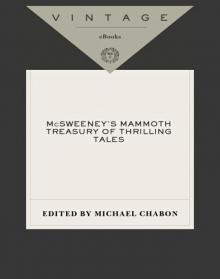 McSweeney's Mammoth Treasury of Thrilling Tales
McSweeney's Mammoth Treasury of Thrilling Tales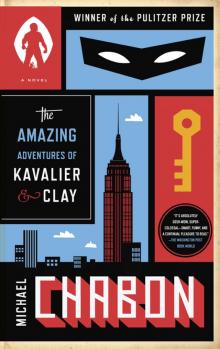 The Amazing Adventures of Kavalier & Clay
The Amazing Adventures of Kavalier & Clay The Yiddish Policemen's Union
The Yiddish Policemen's Union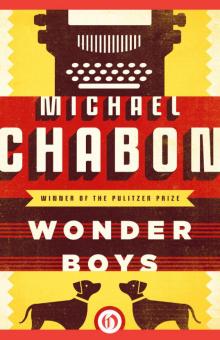 Wonder Boys
Wonder Boys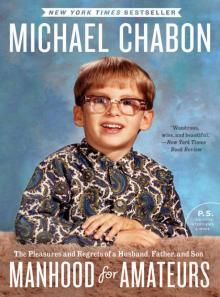 Manhood for Amateurs
Manhood for Amateurs Kingdom of Olives and Ash: Writers Confront the Occupation
Kingdom of Olives and Ash: Writers Confront the Occupation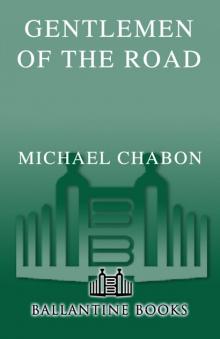 Gentlemen of the Road: A Tale of Adventure
Gentlemen of the Road: A Tale of Adventure A Model World and Other Stories
A Model World and Other Stories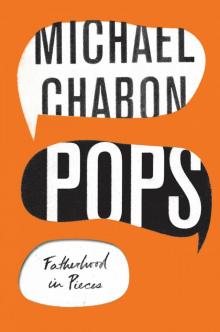 Pops: Fatherhood in Pieces
Pops: Fatherhood in Pieces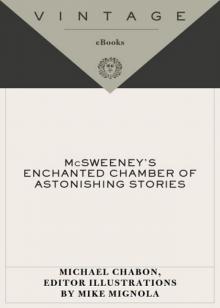 McSweeney's Enchanted Chamber of Astonishing Stories
McSweeney's Enchanted Chamber of Astonishing Stories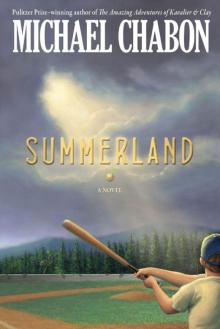 Summerland
Summerland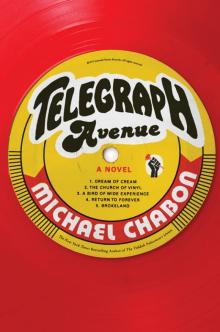 Telegraph Avenue
Telegraph Avenue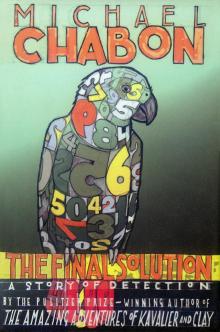 The Final Solution
The Final Solution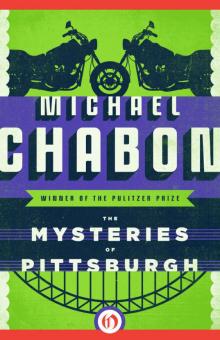 The Mysteries of Pittsburgh
The Mysteries of Pittsburgh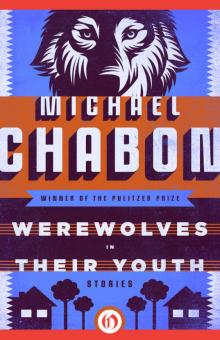 Werewolves in Their Youth
Werewolves in Their Youth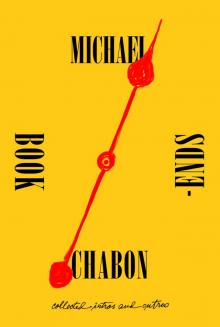 Bookends
Bookends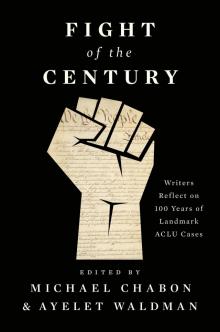 Fight of the Century
Fight of the Century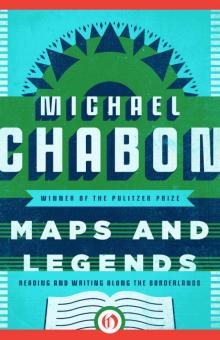 Maps and Legends
Maps and Legends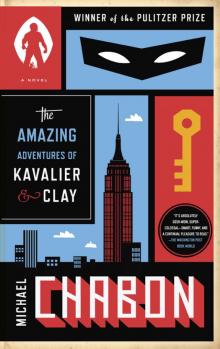 The Amazing Adventures of Kavalier & Clay (with bonus content)
The Amazing Adventures of Kavalier & Clay (with bonus content) Kingdom of Olives and Ash
Kingdom of Olives and Ash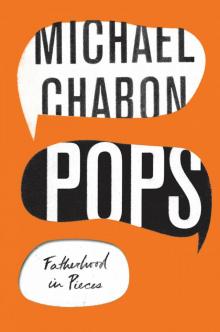 Pops
Pops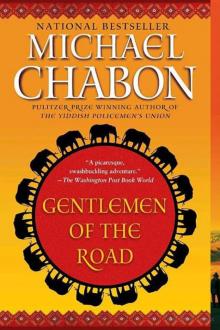 Gentlemen of the Road
Gentlemen of the Road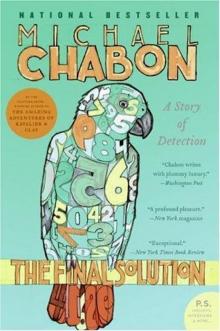 The Final Solution: A Story of Detection
The Final Solution: A Story of Detection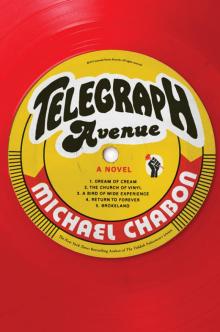 Telegraph Avenue: A Novel
Telegraph Avenue: A Novel